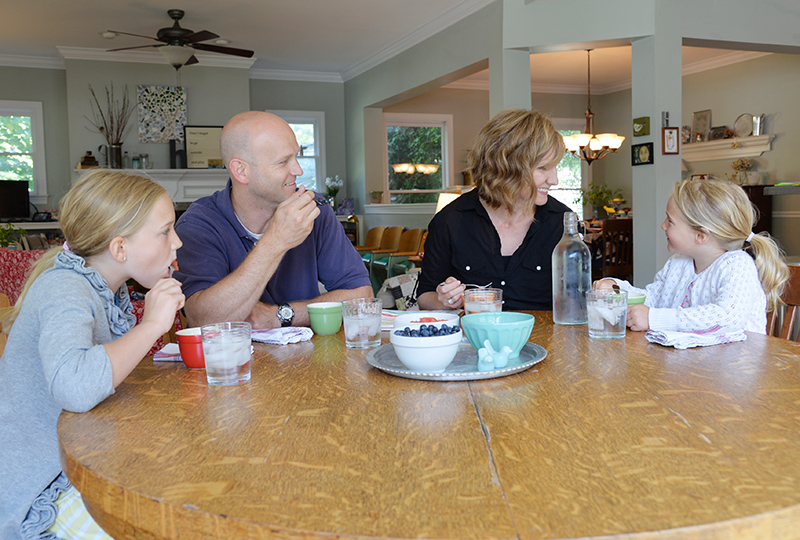Fast food can be convenient, but these five tips will help with the goal of hitting the drive-thru less often.
A while back, our family watched “Super Size Me” for the first time. The documentary was a powerful reminder during a busy season of why that choice was so important to us.
Fast food is convenient and cheap, but we had to ask ourselves, what are we really saving? Maybe a little bit of time or a small amount of money. The more important question is what do those savings cost us?
We realized we were paying with more than our wallets. Eating fast food as a regular part of our diet meant we were paying with our waistlines and our lifelines. I’m sure some will read this and think, “Come on, it’s just food.” That’s what my husband used to say.
But this fact from “Super Size Me” made us realize how true it really is. In a case where two teenage girls sued McDonald’s for their weight gain, lawyers for the fast-food chain argued that the suit was frivolous because the dangers of McDonald’s food are universally known.
What? That’s crazy.
I think it’s a solid indicator that fast food is on the same trajectory today that cigarettes started on decades ago. We’re realizing that what was once thought to be a harmless treat is actually hurting us and if we value our health, we’ll cut this addictive, unhealthy habit from our routines.
Having walked that path, I know it’s easier said than done for busy families, especially if you’re trying to keep your food budget down.
Here are my top 5 tips to get you out of the fast-food line and into the kitchen:
1. Plan ahead.
It doesn’t have to be formal or fancy. Just write your calendar out and know which nights are busiest so you’ll be prepared. Grocery shop with those busy nights in mind. Knowing your kitchen is stocked with things you can pull out and plate rather than cook will make it easier to drive right past the closest fast-food spot and head home for a healthier choice.
2. Develop your “go-to” anti-recipes.
Have a list of meals that don’t require a recipe or any preparation, such as sandwiches or pasta. Knowing you can serve a nutritious dinner without actually cooking helps take the pressure off. Knowing your kids can throw something together without your help is even better.
3. Keep healthy snacks in the car.
When the back seat is packed with tired, hungry kids who just want a quick burger and fries, it can be really tempting to give in and get dinner finished before you even get out of the car. Apples, bananas, granola bars, carrot sticks, crackers, grapes and pretzels are all easy to carry with you and will hold kids over until you can get home.
4. Cook once, eat twice.
On nights when you cook, make extra and use the leftovers for an easy dinner the next night. For example, if you bake chicken on Monday night to serve over whole grain pasta with salad, make extra chicken and use the leftovers in quesadillas on Tuesday. Just toss the cooked chicken into tortilla wraps, top with greens, shredded cheese, salsa and other toppings and serve with a side of fruit.
5. Keep your fridge full.
An empty fridge is a recipe for fast food. I used to grocery shop every two weeks, but now I do it at least weekly to make sure we have easy, healthy food on hand. A bag of apples, a bag of carrots, organic yogurt tubes and a healthy loaf of bread are some of our staples.
Remember, food you prepare at home is going to be a better choice that what you can get in a drive-through line. One of our favorite “busy night” meals is a picnic platter. We load up a big plate with lots of fresh foods from the fridge and everyone sits on the living room floor and snacks.
For ideas and inspiration for inexpensive healthy dinners, check out My Southern Health’s recipe collection, Pinterest or any healthy cooking magazine. They are full of ideas for $5 and $10 dinners that can be made in 30 minutes or less.
Don’t beat yourself up if you hit the drive-thru here and there along the way. It won’t be an overnight change, but you’ll be surprised at how easy it gets. Start by committing to one week without fast food and build from there.
Need help getting your family on board? Watch “Super Size Me” or read “Chew On This: Everything You Don’t Want to Know About Fast Food” by Eric Schlosser. I recommend reading the book first and deciding what information to share with your kids depending on their ages and what you think they need to know to understand your family’s choice.
Calie Shackleford is a health coach, writer and author of the eBook “The ABCs of Super Foods.”

